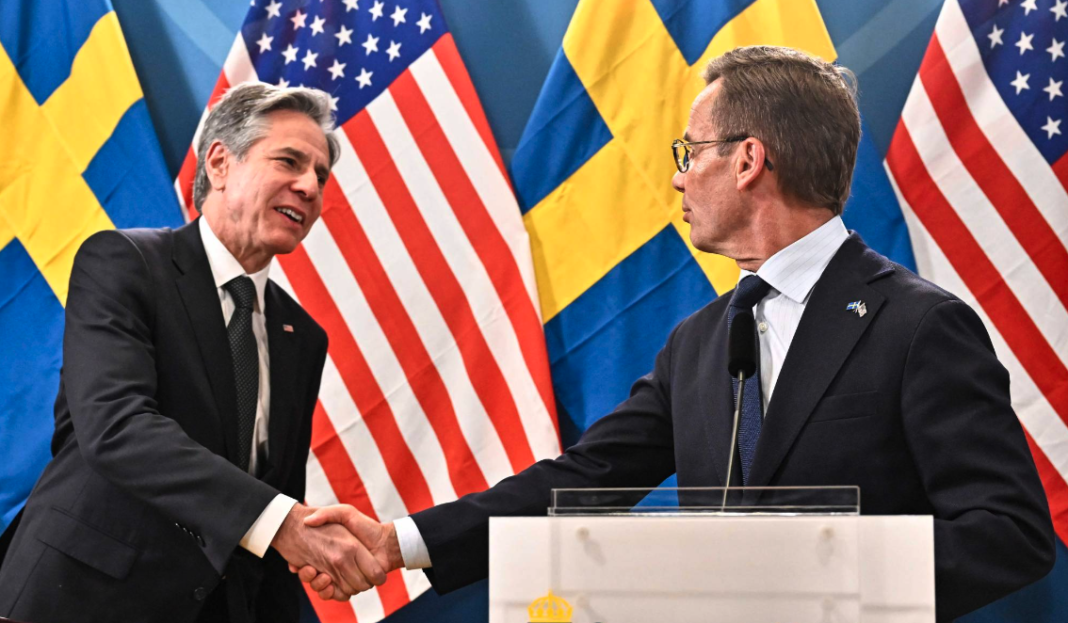At best, trading F-16s and F-16 upgrades to Turkey in exchange for Erdogan lifting his veto on Sweden would be a pyrrhic victory. By Michael Rubin in 19FourtyFive, on June 2, 2023.
Secretary of State Antony Blinken wasted no time after Recep Tayyip Erdogan claimed victory in Turkey’s presidential election.
Speaking in the northern Swedish town of Lulea, Blinken urged Turkey to finalize Sweden’s NATO accession. Angry at Sweden for tolerating both Kurdish political activism and for offering refuge to expatriate Turkish journalists, Erdogan earlier used Turkey’s veto to block NATO consensus unless Sweden met a number of demands unrelated to NATO’s mission.
The Balance of NATO
While Blinken publicly denied any link between Sweden’s NATO accession and delivery of F-16s, Biden has suggested a quid pro quo, as have State Department officials speaking to members of Congress whose support is needed to green-light the sale.
The Biden administration may believe that Sweden’s accession is the paramount interest for NATO, but the White House push to continue to bargain with Turkey over Sweden is a huge mistake. At best, trading F-16s and F-16 upgrades to Turkey in exchange for Erdogan lifting his veto on Sweden would be a pyrrhic victory.
Consider: Russia may be a threat due to its invasion of Ukraine as well as its nuclear brinkmanship, but Sweden’s membership is irrelevant to the type of threat Russia today poses, especially if NATO and Sweden agree to act in concert regardless of former membership. A far greater threat, as Endy Zemenedis, the executive director of the Hellenic American Leadership Council points out, is the prospect of a Greek-Turkish war. Such a conflict would not only be “a far more serious threat,” but it would also pose an “existential threat to NATO.”
He is correct. Acquiescing to Erdogan’s blackmail against Sweden is bad enough, not only because it would incentivize Erdogan’s behavior but it would also encourage other NATO members to use future accessions as opportunities to reap diplomatic reward. But Sweden’s sheltering of Kurds and journalists is just the tip of the iceberg on the list of Erdogan’s manufactured grievances against NATO members. In recent years, he has suggested revising the 100-year-old Lausanne Treaty that finalized the borders of modern Turkey in order to expand Turkey’s territory among the Aegean islands and along its broader frontier.
For Erdogan, this has not just been rhetoric bluster: Rather than defend against Russia, increasingly a major Turkish trading partner despite post-Ukraine war sanctions, Erdogan has used its F-16s and growing drone fleet to overfly Greek islands.
While the White House pressures its allies in Congress to allow an F-16 sale to Turkey to move forward, it has done little to stop Turkey’s far more destabilizing and destructive behavior toward its neighbors. Not only does Erdogan openly threaten Greece, but Turkey’s occupation of Cyprus nears its 50-year mark, Turkish forces and proxies occupy chunks of Syria and Iraq, and Turkey continues an unjustified blockade against Armenia.
Put another way, Biden’s strategy to address Turkey with regard to Sweden is equivalent to treating an ingrown toenail by chopping off the foot. Sweden will eventually join NATO. To expedite that accession by setting NATO down the path to an intra-NATO war that will tear apart the alliance from the inside, however, is strategic incompetence in the extreme. Providing F-16s or avionics upgrades to Erdogan’s Turkey undermines, not enhances, NATO cohesion and capability.
Now a 19FortyFive Contributing Editor, Dr. Michael Rubin is a Senior Fellow at the American Enterprise Institute (AEI). Dr. Rubin is the author, coauthor, and coeditor of several books exploring diplomacy, Iranian history, Arab culture, Kurdish studies, and Shi’ite politics, including “Seven Pillars: What Really Causes Instability in the Middle East?” (AEI Press, 2019); “Kurdistan Rising” (AEI Press, 2016); “Dancing with the Devil: The Perils of Engaging Rogue Regimes” (Encounter Books, 2014); and “Eternal Iran: Continuity and Chaos” (Palgrave, 2005).

